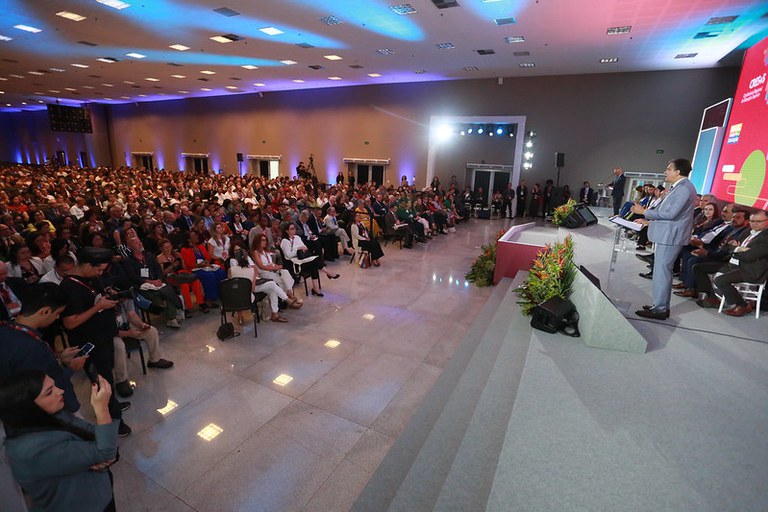Notícias
CRES+5
Investments and a stand for democracy mark the first day of CRES+5
The largest higher education event in Latin America and the Caribbean (CRES+5) ended its first day with two important milestones for the sector's expansion and consolidation. The Brazilian government announced an investment of more than 120 million reais in two programmes to be developed with countries in the region. Underlying this, but no less important, the conference marked the return of Brazil as a protagonist in the international dialogue about the importance of higher education as a means of reducing regional inequalities, creating fairer societies and strengthening democracy.
The restoration of Brazil's leading role in discussions about the future of higher education in Latin America and the Caribbean was a recurring theme in speeches, meetings and at the opening of the event today in Brasilia. The launch of two new programmes, aimed at promoting higher education and the integration with other countries taking part in the conference, translated this new moment for the Brazilian government into action.
The Brazilian Minister of Education, Camilo Santana, announced an investment of 102 million reais over eight years in the Montevideo Group (AUGM), who brings together 41 universities from Brazil, Argentina, Bolivia, Chile, Uruguay and Paraguay to develop programmes of common interest. Also, through the Mova La América programme, 20 million reais will be invested to offer 500 master's and doctoral scholarships for students who want to take up internships at Brazilian federal institutions. Santana stressed that Brazilian investment in higher education is an obligation, and not just an option, and that the greatest progress in the sector over the last two decades began under President Luiz Inácio Lula da Silva, who does not have a university degree.
Despite taking a natural lead in relations, the Brazilian government says that actions are a shared responsibility between all local and regional leaders. According to Rui Oppermann, Director of International Relations at the Coordination for the Improvement of Higher Education Personnel (Capes), Brazil's return to the international stage is especially important when it comes to Latin America and the Caribbean, being neighbouring countries and preferred partners in many areas, such as culture, history, economy and education. "We have many things in common and this conference aims precisely to give this perspective of Brazil's return to the Latin American community, and look at how we can resume all the common development projects that we have always had with them. Historically, they have been expecting proposals from us to continue this partnership."
Dialogue – In the afternoon, conference members met to discuss six thematic axes: higher education as part of the educational system, cultural diversity and interculturality, internationalization and regional integration, education in the face of social challenges, scientific and technological research and the strategic role of higher education in the sustainable development of the region.
Although the themes are different, the working groups are convinced that higher education is the key to fighting negationism, local and regional inequalities, as well as to fostering sustainable development and to preventing a climate disaster.
According to Francesc Pedró, director of UNESCO-IESALC, “it is truly exciting to confirm that, following the first day of the conference, we have been able to establish a shared goal: to reach a consensus on priorities for the next five years. This will enable us to progress towards the common objective of achieving quality higher education that is inclusive and equitable for all.”
Program – On Thursday 14th March, CRES+5 reopens with a conference by Professor Nilma Lino Gomes, former Minister of Women, Racial Equality and Human Rights, followed by a series of symposia from eight other thematic commissions. The day's events will come to a close at a round table featuring the coordinators of the symposia from the second day of CRES+5. See the entire program.
MEC Communications Department

